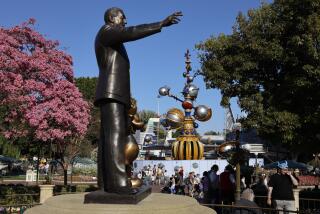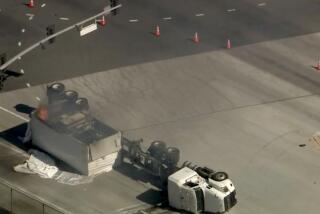Cooley Targets Church Records
The Los Angeles County district attorney’s office is preparing to use a grand jury to force the Roman Catholic Archdiocese of Los Angeles to turn over documents about priests accused of sexually abusing minors, law enforcement officials said Friday.
Dist. Atty. Steve Cooley put the wheels in motion to use grand jury subpoenas to obtain the personnel files after an attorney representing several priests raised objections to the archdiocese releasing the documents.
Cooley had threatened Cardinal Roger M. Mahony with a grand jury investigation two weeks ago unless he promptly gave law enforcement agencies all documents related to the priests under criminal investigation for alleged abuse. The threat came after Cooley’s unsuccessful requests to Mahony.
Donald Steier, the lawyer who represents most of the current and former priests under investigation, told prosecutors he objected to the files’ release because the documents are protected by federal and state privacy laws.
Investigators are seeking the files of Michael Stephen Baker, David Granadino, Stephen Hernandez and Tilak Jayawardene, all priests in the three-county Los Angeles archdiocese.
“Ultimately ... the priests have an interest in their personnel files remaining confidential just like police,” Steier said. “I don’t see [individual officers] turning over their personnel files too readily after a shooting.”
Nonetheless, Steier said he would not object to a grand jury request for documents or any other avenue that would allow him to appeal to a judge. In a 1995 molestation case involving Long Beach priest Ted Llanos, Steier succeeded in having a subpoena for documents quashed.
“I feel our position is not simply an academic exercise,” Steier said. “I think the district attorney will come up with an alternate approach.”
In a letter to William Hodgman, the head deputy district attorney in charge of the sex crimes unit, Steier suggested several means by which prosecutors and police could gain access to the documents. All would require review by a judge or arbitrator.
In a statement, Hodgman said he suspended Friday’s deadline for the archdiocese to turn over documents because of the legal objections made by Steier.
“We were compelled to temporarily stop the process,” Hodgman said. “We will initiate litigation very soon to resolve these issues.”
Hodgman did not discuss the use of a grand jury to compel the release of the documents. But law enforcement sources said prosecutors had begun preparing to ask a grand jury to demand the records.
Michael Hennigan, a Los Angeles attorney representing the archdiocese in the priest cases, said the archdiocese is and has been “ready, willing and able” to turn over documents. But he believes a judge should oversee the process.
“There’s nobody in the district attorney’s office or the police department that doesn’t recognize that these are hot potatoes,” Hennigan said. “There are protocols in place to determine whether investigators can look at personnel files.”
Hennigan said he believed that the district attorney’s office would decide how the documents should be released. He said they had discussed two methods. In one, the archdiocese would give law enforcement sealed envelopes containing those records with an agreement that they would not be opened until a judge granted permission. In another process, he said, a judicial officer would review the documents and turn over those that were deemed appropriate.
“We’ll go along with anything,” Hennigan said. “But we are not legally permitted to simply let people have these documents.”
The district attorney’s office said it made it clear to the archdiocese that records should be turned over to the appropriate law enforcement agencies without delay.
Sandi Gibbons, the district attorney’s spokeswoman, said prosecutors have several options to ensure the records are released. Prosecutors could use subpoenas issued by a grand jury, serve several search warrants or take the matter to a court to resolve, she said. Prosecutors had expected that Steier might step into the fray to prevent the records from being handed over, Gibbons said.
Prosecutors say that in cases where lawyers raise objections to the release of records, it is common to use a grand jury. Given the archdiocese’s objections, employing the power of a grand jury may be far easier than trying to determine what records exist and in which archdiocese office they are located.
“We have not seen a shred of paper at any local law enforcement agency despite all the promise,” said Joseph Scott, Cooley’s director of communications.
The priests whose records are being sought by the Los Angeles County Sheriff’s Department, Los Angeles Police Department and Glendale Police Department are:
* Baker, a retired priest, who told Mahony in 1986 that he molested young boys but was reassigned to parishes and allegedly continued his abuse of minors for more than a decade before the cardinal arranged for him to retire.
* Granadino, a priest at St. Francis of Rome church who is the subject of a Los Angeles County Sheriff’s Department probe into accusations that he molested boys in Norwalk and Azusa.
* Hernandez, an El Sereno priest who is accused of molesting a 15-year-old boy. After he learned of a Los Angeles police investigation, he deliberately cut his wrist and took an overdose of pills.
* Jayawardene, a priest charged in 1991 with molesting a Glendale boy; Jayawardene subsequently fled to Sri Lanka. Glendale police recently asked prosecutors to extradite him.
Prodded by victims, prosecutors and headlines earlier this year, Mahony began to turn over the names of priests accused of molestation after it was revealed that he forced at least eight clerics to leave the ministry because of prior allegations.
As the priest abuse scandal has grown nationwide, dozens of new allegations have been made against current and former clerics. Law enforcement sources say that across the archdiocese--which includes Santa Barbara, Ventura and Los Angeles counties--more than 30 priests are the subject of police investigations.
More to Read
Sign up for Essential California
The most important California stories and recommendations in your inbox every morning.
You may occasionally receive promotional content from the Los Angeles Times.











